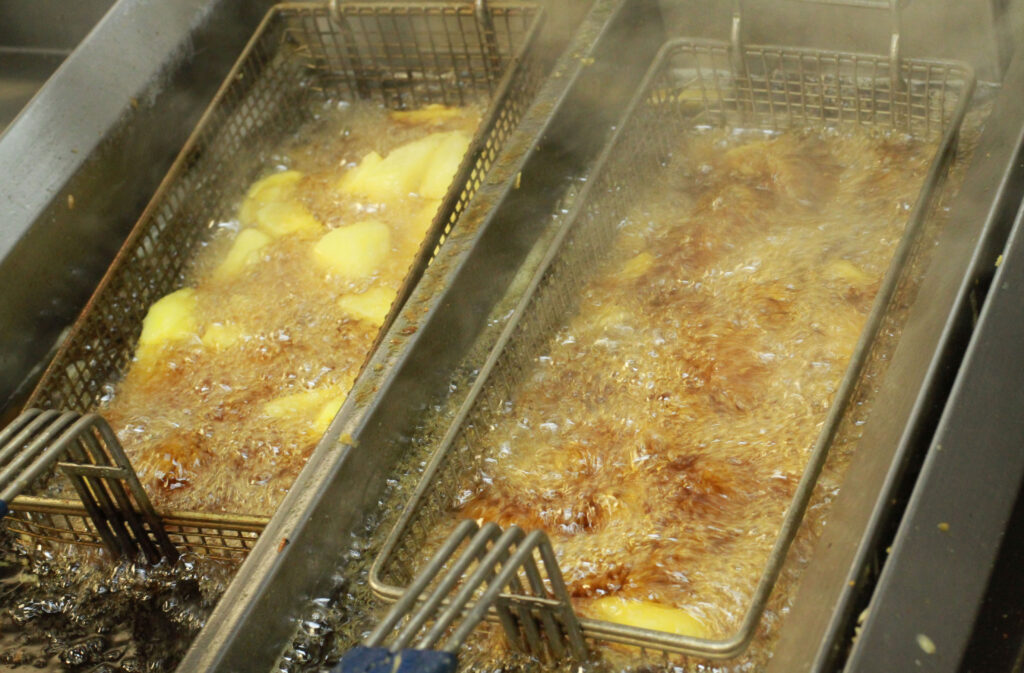With used cooking oil becoming all the more profitable for thieves, how can you keep your stores safe?
Waste oil theft is a growing concern for fish and chip shops which have been increasingly targeted over the past few years, leading to police forces nationwide urging operators to stay vigilant.
The motivation behind these thefts is the rising value of used cooking oil, a sought-after commodity often repurposed into biodiesel or other industrial products. With market prices surging over the past two years, waste oil has become an even more attractive and lucrative target for criminals.
Ellesmere Port police said in a statement last year that it estimated up to one-fifth of the used cooking oil made in the UK is stolen, with the practice of converting used oil into unregulated biodiesel, sold on the black market becoming “an increasingly common trend”. Meanwhile, Adam Baisley, chief commercial officer at Olleco, one of the largest collectors of used cooking oil, says that reports of used cooking oil theft are up 20% compared to pre-pandemic.
Nigel Hodgson, owner of Hodgson’s Chippy in Lancaster, Lancashire, has had two thefts in less than three months. He comments: “What the thieves are doing now is taking your barrels and replacing them with empty barrels so if anyone sees them, they will presume it’s your waste oil company replacing full barrels with empty ones. You’ve got to be so vigilant.”
With many shops selling their used cooking oil to oil collectors, theft results in lost revenue not to mention costly repairs if property is damaged. So, how can you protect your used cooking oil from being stolen?
Secure storage
One of the most effective ways to prevent theft is by securely storing waste oil. Invest in tamper-proof containers (some oil recycling companies will provide these so check first before buying any yourself) and place them in a secure area out of sight and away from easy access. Chaining containers to a wall may also act as a deterrent.
Regular collections
Working closely with a reputable waste oil collection service can help mitigate theft risks. Establish a regular collection schedule to reduce the time that waste oil is left on the premises, thereby minimising the opportunity for theft.
Security cameras
Installing surveillance cameras serves as both a deterrent and a tool for monitoring. High-definition cameras with night vision capabilities can capture clear footage even in low light, providing crucial evidence if theft occurs. Even dummy cameras can act as a deterrent. Support cameras with signs indicating that the area is under surveillance to further discourage potential thieves.
Motion-sensor lighting
Motion-sensor lighting is another effective deterrent. These lights turn on when they detect movement, which can startle and discourage thieves.
Staff training
Educate staff about the risks of waste oil theft and how to prevent it. Employees should also know who your oil collector is, what days of the week collections take place and even what vehicles they use and what uniforms they wear. Encourage staff to ask for ID if they believe people claiming to be contractors are suspicious.
Marking
Marking waste oil containers with identifiable labels or branding can deter thieves who may fear being caught with stolen goods. This can also help police identify containers if they are later recovered.
Check oil levels
Some operators are unaware their oil is being stolen, so regularly check the oil levels in your containers for two reasons. One, oil may have been syphoned off and, two, full containers may have been switched for empty ones without you knowing.
And finally, report any theft or suspicious activity to the police, providing any evidence you have such as dates, times and CCTV footage.








